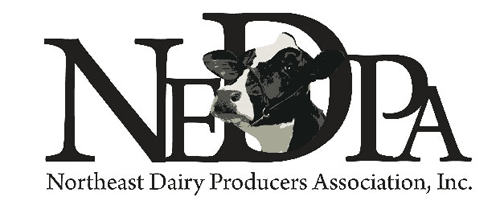
The NEDPA board voted unanimously to oppose the Foundation for the Future program (FFTF).We found the growth management portion of the program the most problematic and heard from a number of NEDPA members that this piece was also of concern to them. We are open to the other pieces of the program, but there are numerous questions yet to be answered satisfactorily and therefore we cannot support those pieces at this time. We are pursuing alternative solutions with like-minded organizations.
The Foundation for the Future program from NMPF proposes radical change to U.S. dairy policy. It eliminates the Dairy Product Price Support Program and seeks to reform the Federal Milk Marketing Order System. It eliminates the Milk Income Loss Contract Program. It introduces the Dairy Producer Margin Protection Program (DPMPP) and it introduces the Dairy Market Stabilization Program (DMSP).
This proposed program (with changes) has been rolled into draft legislation by Representative Collin Peterson from Minnesota. That legislation continues to evolve, to learn more about FFTF go to http://www.futurefordairy.com, to read the evolving legislation go to http://democrats.agriculture.house.gov/Publications.aspx.
Dairy Market Stabilization Program
We are philosophically opposed to taking the decision to increase milk production out of the hands of the farmer and placing it in the hands of the federal government. All farms need to be able to do what is best for their business based upon their individual situations, including expanding or increasing production.
There is significant growth in the demand for milk in this region due to increasing sales of dairy products such as Greek yogurt. This program potentially limits our capacity to supply that demand.
NMPF notes that 13% of U.S. dairy milk production is forecasted to be exported in 2011. Why would we limit production and our capacity as a country to fill growing demand?
The price U.S. dairy farmers receive is largely based on world dairy prices. On a global basis, U.S. milk production is about 14% of all milk produced. It is assumed that reducing 2-4% of the US supply would raise prices.The U.S. farmers would be asked to bear all the cost of balancing the world supply, with the assumption it works. This is a really big assumption. The forces at work in a world market are very complex and not as simple as reducing U.S. milk supply by a few percentage points.
If the markets don't respond to the DMSP then the financial impact could be compounded, severely diminishing marginal income.
The supply management program is based on margin; the difference between the milk price and feed prices.There will be scenarios where feed prices will be high at the same time there is a shortage of milk, creating a margin trigger. DMSP only addresses the milk price, not the feed cost. Hence, in these cases it can't address the cause of the low margin.
The program ceases when U.S. prices are 20% higher than world price, this is too high. A U.S. price just a few percentage points higher produces changes in purchasing behavior of buyers.This program could cause U.S. exporters to be the first to lose sales to other nations without supply management. As tough as it sounds, U.S. prices have to follow the world price down; otherwise we lose the sales and long term customers. If we are going to be an exporter then we can't have domestic supply management.
The Peterson draft of this program places a penalty on production over base, of which 50% goes to the U.S. treasury. We do not oppose programs being cost neutral, however; does the potential exist for this to be a money maker for the treasury at the expense of the farmer?
Dairy Producer Margin Protection Program
We have a preference for programs that put the management of risk in the hands of the dairy farmer. The use of existing risk management programs should be encouraged for farms of all sizes. We support the education of farmers about the benefits of these tools. Individuals may choose not to use risk management tools, however; this does not mean the solution is government mandated programs.
FSA is proposed as the agency of choice to manage this program and at present, crop payments are made public.There is the potential for some farms to receive hundreds of thousands of dollars without the public understanding that farms pay into the program.
If such a program exists we agree there should not be size limits on participation, however; FSA programs historically have limits, we question if no limits on this program can be maintained given the potential large payouts.
Does FSA have the capability to manage this large of a program, historically programs managed by FSA tend to be burdensome and move very slowly.
Eliminating Price Support and Federal Milk Marketing Order Reform
We support the concept of eliminating price supports and federal milk marketing order reform,but there are many questions and the issues are so complex that we feel strongly these pieces need much more work.
Other
We strongly favor the development of Farm Savings Accounts which would encourage farms to set money aside in times of cash surplus.
09.17.2011